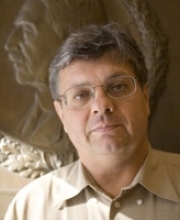
Eugene Shakhnovich
The Shakhnovich Biophysics Lab works on a broad range of topics from Molecular Evolution and Origins of Life to Drug Discovery. Our approach integrates theoretical, computational and experimental work.
Eugene Shakhnovich
Professor
Department of Chemistry and Chemical Biology
Harvard University
12 Oxford Street
Cambridge, MA 02138
Tel: (617) 495-4130
eugene@belok.harvard.edu
Administrative Assistant:Judy Morrison
Website:http://faculty.chemistry.harvard.edu/shakhnovich/home
Lab Size: between 15 and 20
Reserach Summary
The research of Professor Eugene Shakhnovich and his group is directed towards understanding the basic principles of protein folding and structural and dynamical properties of other complex polymer systems.
Some of the questions addressed are: 1) what is required for polypeptide chains to have a unique structure? 2) how is this structure encoded by aminoacid sequence ("prediction problem")? and 3) how does the polypeptide chain form this unique structure in a finite time (the so-called "Levinthal paradox")?
The approach to a solution of these problems is based on utilization and development of modern analytical methods of statistical mechanics such as replicas, renormalization group etc. and numeric studies of non-traditional lattice models with exhaustively enumerated conformations.
Other fields of interest to Professor Shakhnovich include investigation of microdomain structure in random polymer melts and diffusion-controlled processes in living cells. Current projects include: 1) Development of a new approach to and algorithm for the prediction of stable conformations of a protein, based on a combination of statistical mechanical methods such as mean-field theory, exhaustive enumeration of all conformations within a given fold, and Monte-Carlo dynamical simulation. 2) Development of the quantitative theory of protein stability, which takes into account the majority of interactions in protein molecules. 3) Monte-Carlo simulations of folding of polypeptides in which conformations are exhaustively enumerated. These simulations make it possible to address the "Levinthal paradox" and develop a theory of kinetics of protein folding. Within this project also is an evolutionary question of the way in which sequences which are able to fold evolved. 4) Theory of microdomain structure in random copolymers and analysis of unusual phases in such systems.
Publications:
Klein, E.Y., Serohijos, A.W.R., Choi, J.-M., Shakhnovich, E.I. & Pekosz, A.Influenza A H1N1 Pandemic Strain Evolution - Divergence and the Potential for Antigenic Drift Variants. PLOS One 9, e93632 (2014).
